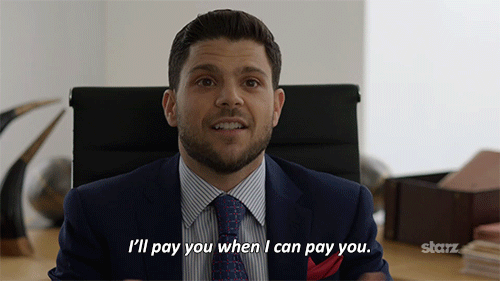There’s nothing funny about money problems. But if you’re carrying credit card debt, you’re not abnormal — the average American owes around $5,700. Plastic can get you into trouble fast, and high credit limits, insane APRs, and a depressed economy conspire to put you even deeper in the hole. If you’re drowning in credit card debt, time is of the essence. The faster you act, the easier it will be to reverse the damage you’ve done to your finances (not to mention your credit score). Before you find yourself without even a pot to piss in, take our advice and get that financial monkey off your back. Here’s how.
Cover Photo: AaronAmat (Getty Images)
Personality decoder: What Your Favorite Social Media Platform Says About You
Deep Dive: Is It Wrong to Pay for Sex?
Visit the Mandatory Shop for great deals on your very own Mandatory merch.
Follow Mandatory on Facebook, Twitter, and Instagram.
Credit Card Debt
-
Stop the bleeding.

First things first – you have to stop spending. Cut up those credit cards now. (But keep your statements because you’ll need the account numbers and customer service phone numbers.) You can’t get out of a hole if you keep digging it.
-
Learn to budget.

To keep from sinking deeper into debt, you have to figure out how you got here in the first place. The best way to do that? Make a budget. And by “budget,” we mean write down every single thing you spend money on for at least a month. We’re talking everything from the $500 you paid for that car repair to the $1 pack of gum you bought at the corner store. No matter how small the expense, it all contributed to the current state you’re in. Once you have all your spending data, consult a handy online guide like this one to make the numbers work for you.
-
Cut the fat.

If you have credit card debt, it’s time to go on a spending diet. This doesn’t have to be permanent, but you do need to be realistic and tough with yourself. Every time you’re about to spend money, ask yourself, “Is this a want or a need?” Rent is a need; travel is a want. Groceries are a need; eating out is a want. Don’t let yourself off the hook. You don’t want to rob your future just to finance today’s pleasure.
-
Negotiate.

Call your credit card companies and explain that you’re having trouble making payments at the current rate. Hopefully, they will be willing to lower your APR or work with you on a different kind of payment plan.
-
Pay down high interest debts first.

Not all debt is created equal. When it’s time to make payments on your various credit cards, your focus should be on the highest interest ones. When you have an influx of money, pay those off first; for the lower APR or 0 percent APR cards, stick to the minimum payments if that’s all you can afford.
-
Transfer your balances.

If you have small balances on several cards, you may be able to open a new, 0 percent APR card and transfer the balances there, then slowly chip away at it month by month. Just make sure that before you do this, you can actually pay off the balance before your interest inevitably skyrockets.
-
Consolidate.

A debt consolidation loan can reduce your interest rate and length of repayment, but you have to be careful so you don’t just end up replacing your old problem with a new one. If you don’t have more money coming in than going out, or your monthly debt consolidation payment is devouring most of your income, this simply won’t work for you.
-
Get credit counseling.

You’re in over your head, but there’s no shame in that. In fact, credit card companies are literally banking on the fact that you can’t figure out how to get out of debt. So give those money grubbers the middle finger and help yourself by going to see a credit counselor. You’re probably broke, but that doesn’t mean you can’t find affordable – or even free – help. Check out local social services agencies or religious organizations for recommendations. A credit counselor can tell you exactly how to bridge the gap between what you earn and what you owe.
-
Declare bankruptcy.

The sad fact of the matter is that sometimes, there is no way out of credit card debt except by declaring bankruptcy. If you’re at this point, you’re not alone. Hundreds of thousands of Americans file for Chapter 7, Chapter 11, or Chapter 13 bankruptcy each year. Consult a bankruptcy attorney before you take this step because the process is complicated, your creditors will fight you, and declaring bankruptcy will affect your credit for years to come.








